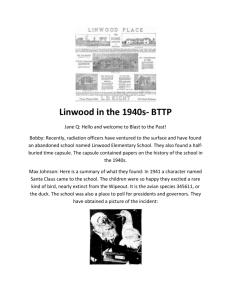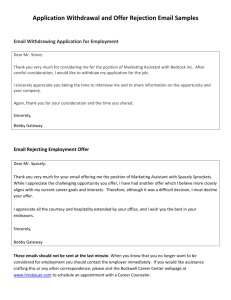I had not seen Bobby in many years, so the invitation surprised me
advertisement
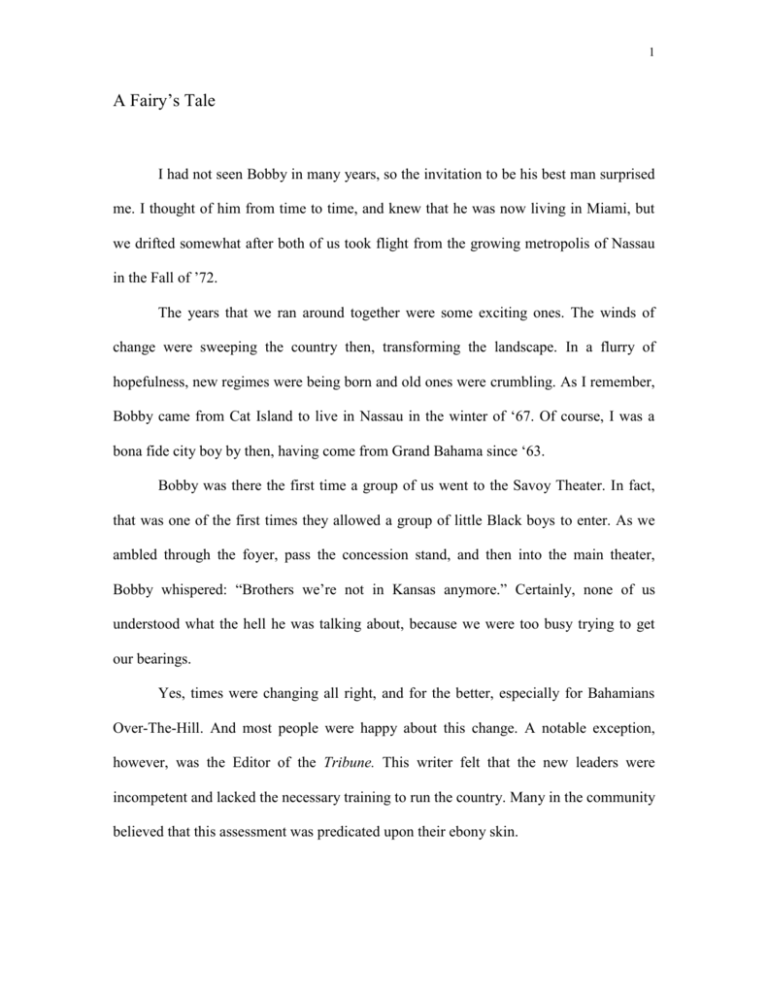
1 A Fairy’s Tale I had not seen Bobby in many years, so the invitation to be his best man surprised me. I thought of him from time to time, and knew that he was now living in Miami, but we drifted somewhat after both of us took flight from the growing metropolis of Nassau in the Fall of ’72. The years that we ran around together were some exciting ones. The winds of change were sweeping the country then, transforming the landscape. In a flurry of hopefulness, new regimes were being born and old ones were crumbling. As I remember, Bobby came from Cat Island to live in Nassau in the winter of ‘67. Of course, I was a bona fide city boy by then, having come from Grand Bahama since ‘63. Bobby was there the first time a group of us went to the Savoy Theater. In fact, that was one of the first times they allowed a group of little Black boys to enter. As we ambled through the foyer, pass the concession stand, and then into the main theater, Bobby whispered: “Brothers we’re not in Kansas anymore.” Certainly, none of us understood what the hell he was talking about, because we were too busy trying to get our bearings. Yes, times were changing all right, and for the better, especially for Bahamians Over-The-Hill. And most people were happy about this change. A notable exception, however, was the Editor of the Tribune. This writer felt that the new leaders were incompetent and lacked the necessary training to run the country. Many in the community believed that this assessment was predicated upon their ebony skin. 2 One day, Bobby and I were walking pass the government building on Shirley Street, under the fiery bloom of a Poinciana, when we saw this little Black boy wearing a blue jean lined with patches, a sweet water high-top tennis, and a dingy white t-shirt selling Tribunes. I convinced Bobby (which took some doing, by the way) that this was an ignorant little boy, because he was putting the nail in his own coffin. “To hell with him if he wants to kill his own dream,” I said to Bobby, “but I’ll be damn’ if I’m gonna let him kill mine.” I held the paper boy against the black, iron-gate along the street and took his papers from him. Further down the road, I threw them in a puddle of water and stepped on them. The water crept quickly through the folds, expanding, turning the papers dark and fragile. Bobby didn’t speak to me for the remainder of the day. For a long time afterwards, I considered all Black people who worked for the Tribune Uncle Toms, from the paper boy to the news room. My views have changed since, but the daily, like a leopard, can’t change its spots. Still, the occasion of the invitation was a pleasant one. I was sitting beside a longtime friend, who had called me out of the blue to be his best man. I was happy. Few people in our neighborhood ever understood Bobby. Over the years, I always thought that in some small way, I did. The hall was small, but cozy and stylish. A light pink and white colored the room. Balloons and ribbons were everywhere. The white, metal arch in front of the podium was decorated with pink Hibiscus. A golden runner trailed from the arch to the entrance door. Bobby was tall and elegant, with his immaculate high-top hair cut, and his white suit, with pink bandanna and bow tie. People were chatting softly and anxiously waiting— waiting for the familiar music and the grand entrance. I observed the excited anticipation 3 on their faces as I gazed around the room. I had seen this happy scene played out so many times before. At times like these, minutes can turn into lifetimes. Sitting there, I reflected upon how much I owed Bobby. He transformed my mind from a tiny stream into a mighty river. I looked up at him and there, like always, was that eternal sadness in his eyes, but he was smiling. “They didn’t come,” he whispered, “but I’m okay.” I reached out and held his hand. From the way he squeezed mine, I knew that he was holding back the tears. “I still love them very much, Buddy, and not one of them showed up to the happiest occasion of my life.” “Continue to be, Bobby,” I whispered. He smiled. It was a saying I had borrowed from him. I have spoken it to myself in many difficult circumstances. Repeating it then called up the memory of when it was first heard: the spring of ‘68. I came home one afternoon and met my mother crying (And if my mother cries, the person who troubled her dies—period). “What happened, Mummy?” I asked. My pressure had already gone up. As I was asking, I was walking, full speed, through the front door to the bedroom. I knew that my mother’s boyfriend kept a gun in the bottom drawer, because I had played with it many times while they were not at home. Immediately, I returned to the porch with the gun in my hand. My mother was crying so much that I don’t think she ever saw the gun. “What happened, Mummy?” I asked again, just so I would know in which direction to proceed. 4 “Das exactly wha’ dey guh do tuh Mr. Pindling,” she said. “Das how dose bastards does do it now.” “Do what, Mummy?” “Boy yuh didn’ hear? Dey kill Martin Luther King!” I froze. King and Jesus were one. This is it! The whole godforsaken world is rotten, I thought. I dashed into the street, still holding the gun, heading toward Collins Wall. Rage had captured my soul. I fired a shot into the air, partly hoping that one of those indifferent angels would fall, but most of all as a warning to the brothers that the end had come. It was all for one, or one for all. All along the sidewalk young men were joining me with baseball bats and crowbars in their hands, anger on their faces, and rage in their souls, heading toward the wall. They had heard. Mothers were hollering and shouting and screaming and crying, but we paid little attention to them, because our souls were compelled by a destiny that awaited us beyond the wall. From out of nowhere, it seemed, Bobby jumped on the sidewalk in front of me. “Where are you going?” he asked. “Out of my way Bobby!” I said. I did not break my stride in the least so he was back-pedaling as we walked. “What are you going to do man? Kill someone!?” “Yes!” “Who?” “Them.” “Them Who?’ “Them!” 5 “Which ones?” “All!” “And what will that get you, tell me?” “Freedom!” “What kind of freedom?” “Freedom from them! That’ll be the last damn dream they kill!” “You can’t ever get freedom, Buddy, until you learn to be.” He struck a cord in my soul that released me from the clutches of that unholy rage, even though I didn’t fully understand what he was saying. So the mission was aborted because of Bobby’s words and the fact that just then we heard the police siren. We scattered. You wouldn’t see that uprising in any history books though, but it lives in the memory of the people who experienced it. Bobby and I became bosom buddies from that day. But I don’t mind telling you that at the beginning he annoyed me considerably. We were constantly arguing because he was always trying to tell me what to do. When I would tell him to leave me the hell alone, he would say: “I’m only trying to correct your behavior.” I would ask him who the hell he thought he was; he would only smile, and that would really set hell up in me. But more than tell me what to do, he told me how to think, and awakened my consciousness. For instance, one Halloween night the corner boys were out, as usual, snatching candy bags from children. One of the boys would walk alongside someone and snatch a bag and run. There were so many people on the streets trick-or-treating in those days, you could easily lose yourself in the crowd. On this particular night, a young fellow was holding to his bag a little tight so when Tom tried to snatch it, it wouldn’t leave the 6 boys hand. Tom saw this as an affront to his god-given right, since he was bigger and stronger, to take advantage of the weak. All of us present felt as Tom did, except for Bobby. Tom started slapping the boy, and punching him in the face and head, telling him to give up the bag, which the boy—in fear for his life perhaps—finally did. All of us watch this with great satisfaction, except, of course, for Bobby. As we sauntered along laughing and making ready to share our bounty, we heard a familiar, but firm and agitated voice from behind us. “Are you morons satisfied now?” I am convinced to this day that if our vocabularies had been just a little more keen, Bobby would have gotten the shit beat out him that night. All of us stopped laughing. We turned. Slowly. “What the hell is a moron, Bobby?” I asked. Bobby was an astute young man. He could size-up a situation in a second. He saw the anger in our eyes, lurking behind our tainted curiosity. So he didn’t go to the dictionary that night, which would have caused him pain; he went to our souls for a definition, and caused us pain instead. “A moron, my friends, is any Black person who realizes that he has so little under the white man’s rule that he puts bread on his table by stealing from little Black children.” He put his pointing finger on his bottom lip, and looking into the moonless night continued; “no, no that’s not a precise definition. A moron is any Black person who is so tired of having his dreams deferred, he decides that dreams are to painful to have so he starts killing the dreams of little Black children. Hmmmmmmmmmm, let’s see. To put 7 it simply, a moron is any Black person who, knowing the history of Black people in this world, takes advantage of another Black person.” By the time he got to his simple definition, those candies that tasted so sweet in our mouths were very bitter in our stomachs. He knew what he had done and he didn’t want to rub it in. He gave his famous parting words—“continue to be brothers”—and left. From that night, all of us boys began to suppress any other feelings we had about Bobby. We knew, no matter what people said about him, that he was someone special. We would listen when he talked to us. When we would get angry with the police for chasing us from sitting on the wall late into the night, he would tell us to control ourselves. “After all,” he would say, “the policeman doesn't understand that to keep your sanity, you have to stay out until sleep comes so when you get home you could find your place on the floor and go straight to sleep so those four woods wouldn’t send your senses running.” Bobby had this uncanny ability to put his finger on the problem, and then articulate it well. All of us boys knew that the crowded rooms our families lived in kept us out at night, but we couldn’t say it like Bobby. “Send your senses running”—I laughed in my mind. Bobby gave all of us hope in those final months of the decade of the sixties. He told us that all that stealing and fighting we had done under the old rule would have to stop. We had to change our attitudes he said, to assist the new government in rebuilding the nation for all Bahamians. Yes, our attitudes did change—everything did. When the turning universe gave birth to the new decade, it also allowed our dreams to be reincarnated. The future of our nation was moving Over-The-Hill, and over Collins Wall. The future was in our hands and we loved it. We knew that we could create 8 a better society than the one into which we had been born. Bobby told us that if we wanted to expand our minds we would have to read. In those days I read my first real books, Manchild in the Promise Land, by Claude Brown, and No More Lies, by Dick Gregory. We were excited. There was only one thing that disturbed us in those days: not seeing much of Bobby. It was as if he were saying by his absence, “I have taught you all I can; now I must go, and you must learn on your own.” In reflection, I suppose that in Bobby’s frequent absences from us he was trying to live out his motto—trying to be. God knows, that is a difficult task in this world, because even before you are born people have decided what and who and how you should be, and if you come here trying to be you, it is usually unacceptable. In any case, things die in winter, and even though we lived in a tropical climate, the early weeks of the winter of ‘72 brought no exceptions to this unyielding rule. I awoke early one Saturday morning determined that I was going to find Bobby, whose shadow I had not even seen in two weeks. I looked everywhere—at least I thought I did—but I couldn’t find him. Against my nature, I decided that I would give up. As I was walking across the yard, going no place in particular, I noticed that old Mr. Banister was standing on his porch watching me. He never said much, not even hello or good morning most of the time. In fact, he only spoke to a passerby if you caught him while he was about to sit down, just before he put his pipe in his mouth. If, however, he got his pipe in his mouth first, he wasn’t going to interrupt his only pleasure to speak to some idle human; but this morning, he spoke. “You lookin for Bobby aint yuh?” 9 I was so accustomed to him not speaking, I was almost past him when I responded quickly: “Yes sir!” “You Bobby friend aint yuh?” “Yes sir.” “You know, sometime best fuh one friend tuh let another friend be.” “Yes sir,” I answered, as if what he said was a question. “But if yuh really his friend, I t’ink he over at Howard place.” “Thank you Mr. Banister, sir.” I started towards Howard’s place. He lived next to a yard that had many fruit trees, but the people didn’t like us boys taking them. I had discovered the previous day though that they had gone away. So I decided to climb a Dilly tree and get a few dillies before going on my way. I positioned myself behind leaves and limbs so as not to be easily detected by someone passing. As I bit into the fleshy meat, the sweet juices, like a clear and thin caramel, drained down the corners of my mouth and collected under my chin. “Naseberry! Naseberry! insisted the Trinidadian man who asked us to pick some from his tree on Thompson Lane. But at that moment of bliss, on that strange day, it didn’t matter to me what name they called them; they would still be cotton candy from a tree. As I reached over for another, my eyes caught Howard's bedroom window. The gentle breeze pushed the curtain aside and there was Howard and Bobby naked, embracing each other. Then they kissed. The slimy sweetness and the grainy texture of the earthy brown fruit rushed from my stomach and splattered the dark-green leaves, discoloring the bell-like white blossoms of the tree. 10 That was the day my foundations shook. But I decided a long time ago not to recall the feelings I had that day. I am ashamed of those feelings now. In the years since, I have seen men who raped and murdered women and children, who dropped bombs indiscriminately, mangling bodies and cities, decorated with medals of honor for bravery and valor; I have seen persons who maintain the flow of drugs in a community, devastating the delicate fabric of the family, hailed as outstanding, law-abiding citizens and heroes; I have seen individuals who were supposed to be servants of the people become servants of themselves; so Bobby standing naked embracing Howard isn’t repulsive anymore. I didn’t say anything to anyone that day. I just went home and peered at the four woods. The night was restless. I kept waking up every time that devious mind that roams at night tried to take me up that Dilly tree. The next morning brought no reprieve. I got the news that during the night “persons unknown” entered Howard’s house and beat him to death with a baseball bat, and that Bobby was hospitalized with four broken ribs, a broken leg, collarbone and multiple bruises. Bobby was in a coma for three days. After about two weeks I finally decided to visit him. When I strolled into the open ward, towards Bobby’s bed, every eye was on me. “Be careful, Buddy,” he whispered. “If you talk to me they will call you Sissy.” I didn’t respond. I just eased into the chair. “How are you doing?” I asked, finally, trying to shatter the unbearable silence. “I am not doing anything, but I am feeling sick—sick of this world.” I didn’t respond. 11 “Not once in my life, not once have I hurt anyone.” he whispered, with tears rolling down his cheeks. “I care about people, but they wouldn’t let me be, Buddy, they wouldn’t let me be.” I always thought that Bobby was too strong to cry, too strong to be broken. It was only later that I began to realize all the internal struggles he must have had. He had triple jeopardy. We only had to struggle with being Black and poor. I sat there quite bewildered, not knowing what to say. “You are the only one who came to see me, Buddy, not even my mother came. Since I woke up I have felt so alone.” “How did this happen to you, Bobby?” I found the courage to ask. “How did what happen, Buddy? You mean how did I wind up in this bed beaten half to death, or do you mean how I came to be me? I believe, Buddy, that this is the only time ‘why’ might be easier to answer than ‘how’. I am here in this bed because I love Howard.” His last statement bothered me and impulsively I blurted out: “Why?” From behind a vacant stare, he asked: “Why do birds fly, Buddy?” I was becoming increasingly annoyed so I shouted, “Because God made them that way, Bobby!” He didn’t respond. He merely gazed at the ceiling with tears still sliding form the corner of his eyes . . . just as it was happening in the pink and white hall, I noticed, my thoughts being interrupted by the bridal march. I patted his face with my hanky. He offered a signature Bobby smile—always radiant. We both got up to face his entering partner. 12 John was handsome, too, in his pink smock and white turban, which appeared as a halo around his dark forehead, as he approached the altar. He and Booby held hands. The minister asked: “Do you promise to love and cherish each other tell death parts you?” “We do.”
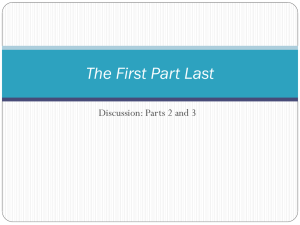
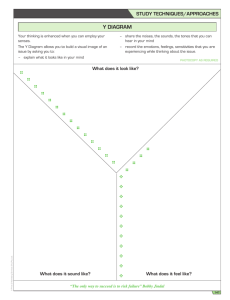
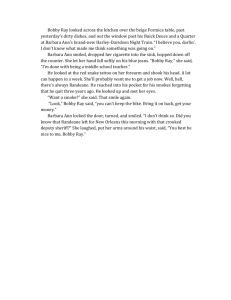


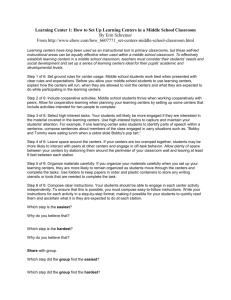
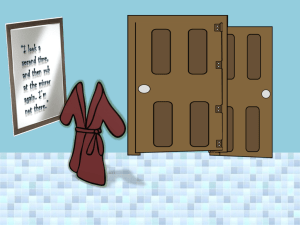
![20 Newsletter Term 2 Wk 5 2015 Week 21 [doc, 6 MB]](http://s3.studylib.net/store/data/008023078_1-d43f4e297d723ece5fe4fb96794f8419-300x300.png)
